Curated mainly for the diseases above the neck. Mainly indicated for the diseases of eyes, ears, nose, and throat. Clears the nasal pathway and the sinuses. Indicated for Nasya (nasal administration of medicine). Prevents hair fall and damage. Arrests premature greying of hair. Improves functioning of the sense organs in the head. Enhances the neurotransmitter activity in the brain.
Nasya The Tamer of The Nasal Tracks
Can you believe that the nose is the starting point of some paramount pathways? True, the nasal orifice to be precise, is the entrance to the strong sense organs located in the head the eyes, ears, nose, and throat; the parts that man vision, hearing, gustation, and voice production. Whatever goes in through the nostrils fills the whole head including the sinuses, throat, and blood vessels. This is the basis of Nasya, the Ayurvedic Panchakarma procedure of administering nasal drops. Ayurveda considers Nasya as a complete solution for the diseases above the neck.Nasal drops can be in the form of oils, decoctions, or herbal extracts, and have to be selected according to the Doshik levels and the strength of the person. It can be employed in both preventive and curative aspects which means you can do it regularly without fearing any side effects.
Sitarams Anu Taila The Healer And The Hegemon
Made using the authentic reference from the classical textbook Astangahridaya, Sitarams Anu Taila is a hundred percent natural, herbal, paraben-free product indicated for Nasya. Anu Taila is praised for its action on the diseases of the head and neck, and also respiratory conditions. Even healthy people can do Nasya with Anu Tailam regularly, as its effects go far beyond disease management.
Features & Benefits
Anu Tailam pacifies Vata and Kapha. It is especially helpful in the diseases of the eye, ear, nose, and throat as it drains the vitiated Kapha from the upper body. The goodness of Jeevaneeya Gana drugs soothes the passages and provides them with unctuousness. Regular Nasya with Anu taila has remarkable effects on skin and hair and can prevent the signs of early aging such as premature greying, wrinkles, and dullness. It protects the hair from breakage and damage. It promotes the growth of strong, lush hair. Anu Tailam clears nasal passages and sinuses, and effectively manages respiratory issues and headaches. It enhances the senses like vision, hearing, olfaction, and gustation. Daily use of Anu Tailam can benefit the brain by interfering with the neuronal as well as the neurotransmitter activities and thereby sharpening intellect and reflexes.
The nasal orifice is a simple but powerful access point to the system of the Ear, Nose, Throat, and Eyes and the sophisticated functions of the brain. Nasya or nasal instillation of medicated oil is one among the Panchakarma or the five Ayurveda Sodhana (Purifactory) therapies, that is used very effectively to remedy problems ranging from minor cosmetic ones to endocrine malfunction and neurodegeneration disorders.
Anu Tailam is a classical combination prescribed for regular Nasya in healthy individuals for the upkeep of health and beauty, and in the diseased as well, for ridding the body, especially the Uttamanga (Head), of Kapha-Pitta disorders and balancing the tridoshas.
- A well-crafted combination of Kapha alleviating drugs like Darvi, Agaru, Vidanga; Pitta pacifying drugs like Swetachandana, Utpala and Ramaccha; Vata pacifying drugs like Bala, Vilwa, Sthira; and nourishing drugs like Jivanti and Mustha in a rich base of sesame oil fortified with goats milk.
- Anu Tailam is lauded for its capability to treat diseases effectively and imbalances rising above the shoulder, i.e. It can treat the diseases of eyes, ears, nose, throat, oral cavity, scalp and maintain their health and function.
- Regular Nasya with Anu Tailam is recommended during periods of seasonal flu, cough and cold, as it protects the oral cavity and nasal orifice from invading microbes and infection.
- It is used as a Panchakarma therapy in suitable doses, for draining out vitiated Kapha from the upper body.
- Anu Tailam instilled into the nose imparts unctuousness. It delivers the nourishing properties of the Jeevniya Gana drugs( drugs that increase Ojas or vitality) to the body.
- It arrests hair fall and breakage, premature greying and revives dull, lustreless hair.
- It enhances the functioning of the sense organs located in the head. It protects vision, hearing, olfaction and taste.
- Regular application of Anu tailam can tap into the brain functions and modulate the activity of neurotransmitters in the head.
Dosage and Instructions
Preferred to use in the early morning time. Massage the face and neck with sesame/coconut oil and give mild steam. Then place Anu Tailam drop by drop, one nostril at a time. Keep the other one closed. Can be used in both preventive and curative aspects. Suitable for all ages.
For daily usage-2-4 drops of Anu Tailam on each nostril (for adults).1-2 drops of Anu Tailam on each nostril (for children).
For treatment purposes as per the instructions of the physician.
Key Ingredients
Vilwa (Aegle marmelos)
Known by the names Bael or Bengal quince, Vilwa is a plant known for its anti-inflammatory and anti-oxidant actions. The Vilwa fruit has remarkable medicinal properties and is often considered a pacifier of Vata and Kapha whereas the Vilwa root balances all three doshas. It promotes metabolism and especially benefits the digestive system by increasing the appetite, relieving dysentery, reducing the pain caused by ulcers, and managing gastritis due to its anti-inflammatory properties. The same makes it useful in relieving sinusitis too. Powdered ripe fruit is a laxative and therefore is used in treating constipation.
Yashtimadhu (Glycyrrhiza glabra)
The Yashti or licorice plant is an anti-inflammatory, antimicrobial agent, which is employed in various allergic conditions. Glycyrrhizic acid present in it is a potent immunomodulator that prevents viral growth, thereby reducing the risk of a viral infection. It is used in treating tonsillitis and respiratory conditions like bronchitis, asthma, and allergic rhinitis.
Musta (Cyperus rotundus)
Musta is an anti-inflammatory, antipyretic, analgesic, and antibacterial herb with cold potency. The tubers of Musta are found to be rich in several components which are potent antimicrobial agents. It improves skin texture and tone and relieves itching. It is said to be effective in nerve-related disorders caused by Vata and in improving intellect.
Tvak (Cinnamomum Verum)
Cinnamon is an effective antioxidant that protects the body from toxic free radicals. Its anti-inflammatory properties combat cell damage and facilitate cell repair. Cinnamon is good for the digestive system and helps manage conditions like nausea, vomiting, abdominal colic, and gastric irritation. It is carminative and antifungal and is known to improve appetite. It is also an expectorant that helps clear the respiratory pathways. Cinnamaldehyde, a compound in cinnamon shows antimicrobial activity in the oral cavity, therefore is effective in preventing dental caries and bad breath.
Daruharidra (Berberis aristata)
Commonly called Tree turmeric or Maramanjal, Daru Haridra has anti-inflammatory, anti-pyretic, antidiarrheal, and antibacterial activities. Used for skin problems like inflammation and psoriasis as it has anti-inflammatory and anti-psoriatic activity. It helps in managing acne by preventing the growth of pimple-causing bacteria and reducing inflammation with its antibacterial and anti-inflammatory properties. It fights infections and is a common ingredient in the formulations for eye and ear diseases.
Sariva (Hemidesmus indicus)–
Also known by the name Indian Sarsaparilla, Sariva is a widely used herb in Ayurveda, mainly for the management of gastritis, nausea, and menstrual problems due to hormonal imbalances. It is also considered as Jwarahara ( that which relieves fever) and Dahashamaka (that which mitigates burning sensation), due to its remarkable ability to lower the body temperature. It balances all three doshas. Sariva is also helpful in relieving skin diseases and itching. It is a potent antioxidant that helps to get rid of toxins from the body.
Jivanti (Leptadenia Reticulata)
It is also known as Cork swallow-wort. According to Ayurveda, it improves vision and nourishes the body by enhancing strength, life expectancy, and immunity. It balances all the three Doshas and the Vata and Pitta Doshas in particular. Its properties include Chakshushya that is improving vision and treating eye disorders, nourishing, and Balya. Improves immunity.
Jala (Coleus Aromaticus)
Known as the Mexican mint, it is used in Ayurveda as an antimicrobial, antibacterial, antifungal, cytotoxic, and antioxidant .it is mainly used in treating nasal bleeding disorders. It is used to prepare formulations to treat headaches and sinusitis.
Devadaru (Cedrus Deodara)
Known as Himalayan Cedar, it helps treat cough also treating sinusitis and other nasal disorders. It is also used as an analgesic to treat headaches. It also has excellent anti-inflammatory properties that relieve chronic inflammations.
Jalada (Cyperus Rotundus)
It is commonly known as the nutgrass. It is used in for its anti-inflammatory properties.?It also has various medicinal properties and acts as an analgesic antibacterial agent and helps in reducing inflammation in the nasal passage.
Tvak (Cinnamomum Verum)
Also known as the true Cinnamon tree. It is used in traditional medicine as a carminative, astringent, haemostatic, antiseptic, antispasmodic, and expectorant.
Sevya (Vettiveria Zizaniodes)
Also known as the Khuskhus grass, it is known for its hematinic expectorant, antimicrobial antibacterial and antiasthmatic properties. It is used as a detoxifier and aids wound healing .also it is cooling in nature.
Gopi (Hemidesmus Indicus)
Also known as Indian sarsaparilla, it is mainly used as a rejuvenating agent for nourishing the body and also as a cleansing and detoxifying agent. It also has anti-inflammatory properties and is also rich in antioxidants.
Hima (Santalum Album)
Also known as sandalwood, It is traditionally used in the treatment of skin disorders. It has antiseptic and anti-inflammatory properties. It helps treat headaches and migraine.
Darvi (Berberis Aristata)
Also known as Indian barberry or tree turmeric, it is used traditionally as an antifungal, antibacterial, antioxidant, antiviral and anti-inflammatory. Its formulations are used to treat eye and ear infections.
Madhuka (Glycyrrhiza Glabra)
Known as liquorice, it has anti-ageing properties.?It is a multipurpose ingredient helpful Ayurvedic medicine as an anti-inflammatory, antioxidant, anti-cancer, antibacterial, anti-arthritic, analgesic, and antacid. It is useful in curing respiratory diseases like bronchitis, asthma, chest congestion and sore throat.
Plava (Cyperus Esculentus)
It is also known as tiger nut. It is reported to help in preventing heart disease and thrombosis. It also activates blood circulation. It is also known to have antimicrobial properties.
Vari (Asparagus Racemosus)
It is also known as buttermilk root or climbing asparagus. It is called the queen of herbs. It is useful in Ayurveda as a nutritive tonic, rejuvenating, antioxidant, antimicrobial, anti-depressant, adaptogenic, and immunomodulatory.
Pundrahva (Sachaarum Officinarum)
It is commonly known as sugarcane. A cooling Ayurvedic antiseptic that is said to give strength and comfort to the mind and heart.
Bilva (Aegle Marmelos)
It is also known as bael or Bengal quince. It is used in the treatment of sinusitis and the common cold. It is famous for its antioxidant, anti-inflammatory and laxative properties.
Ulpala (Kaempferia Rotunda)
It is also known as water Lilly. It is used in Ayurvedic medicine as an antitumour, antitoxic and anti-inflammatory. It is also used to initiate hair growth, treatment of tremors and convulsions.
Dhavani Dwayam (Solanum Xanthocarpum)
Also known as the Indian night shade, It is used in traditional medicine as an antioxidant and anti-inflammatory agent. It is used in the treatment of infectious and degenerative diseases. It is used in respiratory diseases to manage cough and is used as an expectorant.
Brihati (Solanum Indicium)
It is also known as black nightshade. One of the potent Dasha Moola herbs. It has various applications as anti-inflammatory, astringent, carminative. It used in the treatment of asthma, chronic fever, colic spasmodic cough etc.
Sthira (Desmodium Gangeticum)
Also known as tick clover, this herb is used in Ayurveda as an anthelmintic, immunity-stimulating, anti-catarrhal, antioxidant, and nervine tonic. It balances Vata and Kapha Doshas.
Agaru (Aquilaria Agallocha)
It is commonly called as Agarwood. It is used in traditional medicine as an astringent, carminative and antiasthmatic. It Is also used in Ayurveda to help treat skin diseases.
Krimihara (Embelia Ribes)
Commonly called as false black pepper it has wound healing properties in Ayurveda. It is used for its anti-bacterial, antiprotozoal, analgesic and anti-inflammatory properties.
Kushta (Inula Racemosa)
Known as the Indian Costus root, has been reported for its antioxidant and anti-ageing properties. It contains kaempferol, gallic acid, caffeic acid and other essential phenolics that exerts significant anti-ageing properties.
Tudi (Elettaria Cardamomum)
Also called as cardamom, it balances Kapha and Vata Doshas. It is used in Ayurveda as an antioxidant.
Kinjalka Kamala (Nelumbo Nucifera)
It is called as sacred lotus. It is useful as an Ayurvedic diuretic, coolant, antipyretic and tonic.
Aja Ksheera (Goats Milk)
Highly nourishing without the cooling effect of cows milk.
Tila Thaila (Sesamum Indicium)
Also called as sesame oil, it is used in Ayurveda to treat neuromuscular disorders. It is strengthening and gets well absorbed by the tissues.
Anu tailam is also enriched with the wholesomeness of other ingredients like Shatavari (Asparagus racemosus), Ushira (Vetiveria zizanoides), Chandana (Santalum album), Jala (Coelus aromaticus), Devadaru (Cedrus deodara), Plava (Cyperus esculentus), Dhavani dwayam (Solanum xanthocarpum Solanum indicum), Sthira (DEsmodium gangeticum), Kushta (Inula racemosa), Kamala (Nelumbo nucifera), etc. in the base of goats milk and sesame oil. All these herbs are Kapha-Vata alleviating and are suitable for improving the senses.
100% Natural. Herbal. Vegetarian. Paraben-free.













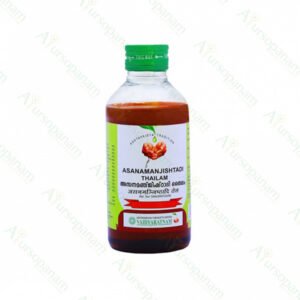



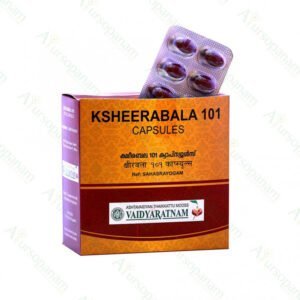


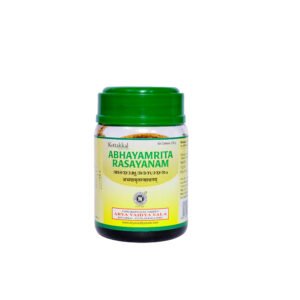








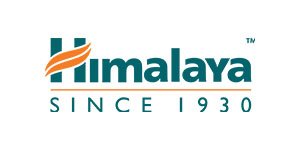




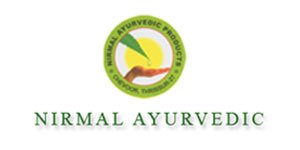






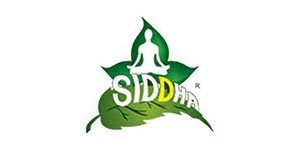











Ratings & Customer Reviews
Reviews
There are no reviews yet.